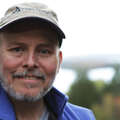Understanding The Patient Perspective with Dr. Randolph Chitwood
By Adam Pick on May 8, 2013
It’s a rare occurrence when I meet a world-renown cardiac surgeon who has also been a patient.
That said, when I recently connected with Dr. Randolph Chitwood, I wanted to learn more about his heart surgery experience and how it shaped his career as a surgeon. So you know, Dr. Chitwood is a heart valve guru having pioneered many techniques including robotic mitral valve repair surgery.
Thanks to Dr. Randolph Chitwood for sharing his experiences as a patient and a surgeon. Also, I want to thank Dr. Chitwood and the East Carolina Heart Institute for taking such great care of many patients from our community including Scott Newson, Lori Glew and Amy Machty.
Keep on tickin!
Adam
P.S. A written transcript of this video is provided below.
Dr. Randolph Chitwood: I practice in North Carolina, at the East Carolina Heart Institute. And I am the director of the Heart Institute as well as an experienced cardiovascular surgeon. I have been in practice since 1984. And I would expect that I have performed over 10,000 heart operations. But more importantly, I developed a special interest in valve surgery, and performed over 3000 mitral valve operations, of which most of those are repairs.
Adam Pick:What attracted you to cardiac surgery?
Dr. Randolph Chitwood: Well you know it is very interesting Adam, I was not into surgery as a medical student. But, then I met a young cardiac surgeon who took me to the operating room and I saw heart operations. From that moment on, I wanted to be a cardiac surgeon. I like the physiology. I like the patients. I like all the technology associated with it. I also like the outcomes. These patients did well most of the time after heart surgery. So that is what really attracted me.
Adam Pick: In addition to being a surgeon, I also understand that you were also a heart surgery patient. Is that true?
Dr. Chitwood, MD: I have been a heart patient — just like you. I had a coronary artery bypass operation done 18 years ago. I have a strong family history of coronary artery disease. The procedure has been very good to me. I have not had any other operations or interventions. I assume I am healthy today.
Adam Pick: How did you go about the process of finding the right surgeon for you?
Randolph Chitwood, MD: What I would tell others in selecting your surgeon… You want to do it not just on personality — I think that is extremely important. But, you want to ask your potential surgeons about their results. You want to ask your surgeon how long they have been doing it. You want to make sure they have a supportive hospital. And today, it is all about outcomes. It is okay to ask surgeons about their outcomes.
Adam Pick: I have heard you use a phrase before, “informed consent versus informed understanding.” Can you share for our patient community what you mean by that?
Dr. Chitwood: Informed consent is basically, telling the patient what the operation is about, the expected outcome, the alternative therapy, the possible complications and to answer their questions. That is the legal form of informed consent. But is that informed understanding? In other words, does the patient really understand what you are talking about? You must make sure the patient understands the operation they are going to undergo – the possibilities, the opportunities, and the possible results.
Adam Pick: It has now been 18 years since your own heart surgery. What did that experience teach you as a surgeon?
Dr. Randolph Chitwood: My coronary artery bypass surgery taught me how to be a patient. And even though I have operated on many patients, my father was a doctor, my grandfather was a doctor, there is nothing like being a patient. Also it made me thinking about minimally invasive cardiac surgery. It was one of those epiphanies. So you know, I have a big incision… Isn’t there another way we can do this?
Adam Pick: What is the most important piece of advice you would give a patient about to go through heart valve surgery?
Dr. Randolph Chitwood: The advice I would give to most patients would be… In most circumstances it is a safe operation. There is a team approach today. Everybody will be taking good care of you. There are possible complications, but let us go with our data, which suggests that if you are a healthy individual, you should have a very low risk of mortality and morbidity. If someone does have a high risk of morbidity-mortality, then you have to be completely honest with them. You know, you got to provide comfort with the idea that you could have a complication, but you will be better in most circumstances after surgery.
|
sherrie bischof says on May 13th, 2013 at 9:32 am |
|
Two and a half months since my aortic valve replacement and aneurysm repair. Still exhausted. Forced to go back to work. Still in rehab. Depression is really getting me down. I hear other patients talk about how great they feel and I want to slap them!!!! |
 |











